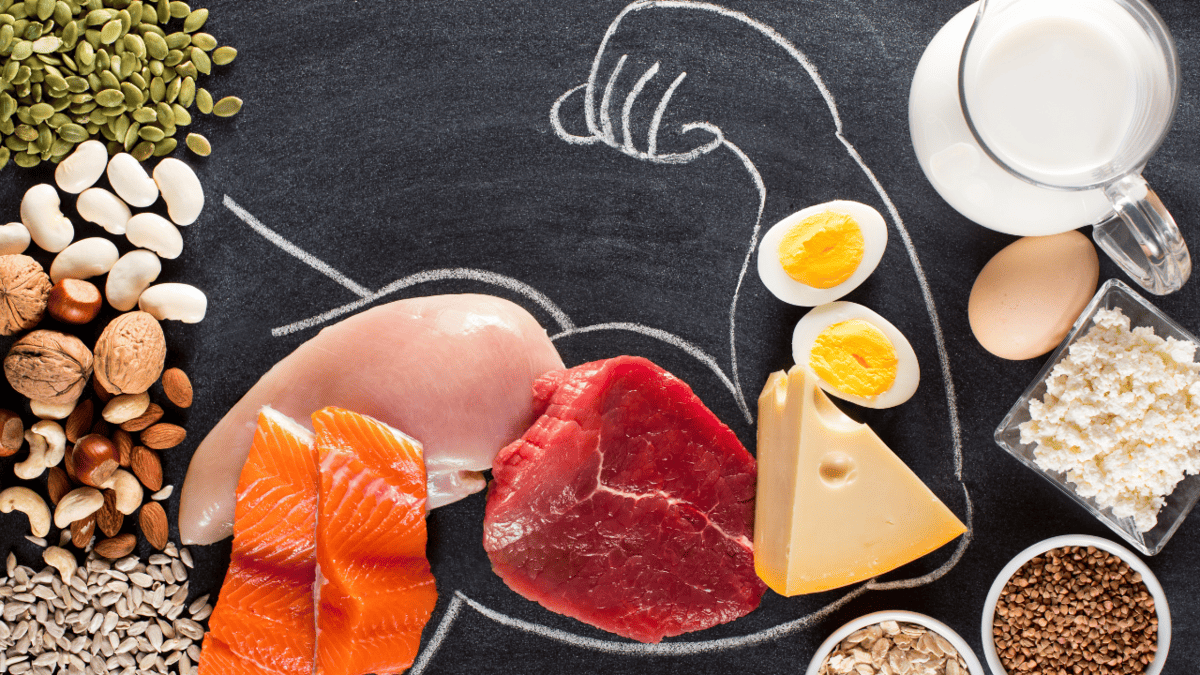Whether you’re a fitness enthusiast looking to build muscle or a beginner just starting out on your fitness journey, this guide will provide you with everything you need to know about protein and how it can help support muscle growth and repair. Protein is a crucial nutrient that provides the building blocks for muscle tissue, and understanding its role in muscle building is essential for anyone looking to improve their physique and overall health. In this guide, we’ll cover everything from the basics of protein to its role in muscle recovery and fat loss. So, let’s dive in and learn all about protein and how it can help you achieve your fitness goals!
What is Protein
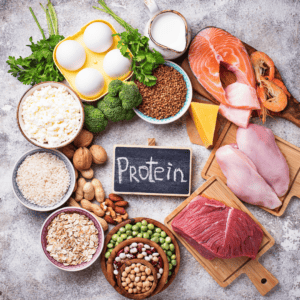
Protein is a macronutrient made up of amino acids. Amino acids are the building blocks of muscle tissue, and protein provides the body with the materials it needs to repair and grow muscles. Protein is essential for muscle building because it supports muscle growth and repair. When you work out, you create small tears in your muscle tissue. Protein helps repair these tears and build stronger muscles. In addition to its role in muscle building, protein also plays a critical role in many other bodily functions, including the immune system, hormone production, and enzyme activity.
Understanding Protein
Protein is a macronutrient made up of amino acids. Amino acids are the building blocks of muscle tissue, and protein provides the body with the materials it needs to repair and grow muscles.
Protein is essential for muscle building because it supports muscle growth and repair. When you work out, you create small tears in your muscle tissue. Protein helps repair these tears and build stronger muscles.
The amount of protein you need for muscle building depends on a variety of factors, including your age, weight, and activity level. Generally, it’s recommended that adults consume 0.8 grams of protein per kilogram of body weight per day, but athletes and people looking to build muscle may need more.
Different types of protein offer different benefits. Animal sources of protein like meat, poultry, fish, eggs, and dairy are complete proteins, meaning they contain all essential amino acids. Plant sources of protein like beans, lentils, tofu, tempeh, nuts, and seeds are incomplete proteins but can be combined to provide all essential amino acids.
Animal Proteins
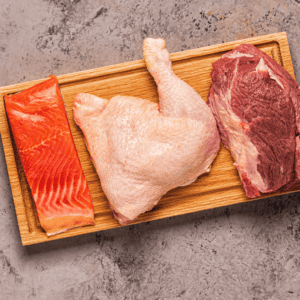
Animal sources of protein are some of the most commonly consumed types of protein, and they provide a complete source of all nine essential amino acids that our bodies need to build and repair muscle tissue. Here are some of the most popular animal sources of protein:
Meat: Beef, pork, lamb, and game meats are all excellent sources of protein. They also contain essential vitamins and minerals like iron and zinc that are important for muscle growth and overall health.
Poultry: Chicken and turkey are lean sources of protein that are low in fat and calories. They can be cooked in a variety of ways and are a great addition to any muscle-building diet.
Fish: Fatty fish like salmon, tuna, and mackerel are not only high in protein but also contain healthy omega-3 fatty acids that can help reduce inflammation and support heart health.
Eggs: Eggs are a versatile source of protein that can be eaten at any time of the day. They contain all nine essential amino acids and are also high in vitamins and minerals like choline, which is important for brain function.
Dairy: Milk, cheese, and yogurt are all good sources of protein that also contain calcium and other important nutrients for muscle growth and overall health.
Incorporating animal sources of protein into your diet can be a great way to support muscle growth and improve your overall health. However, it’s important to choose lean sources of protein and consume them in moderation to avoid consuming too much-saturated fat and cholesterol.
Plant sources of Protein
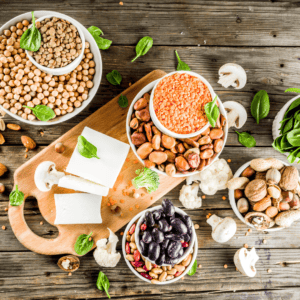
Plant sources of protein are an excellent option for vegetarians and vegans who want to incorporate more protein into their diet. Unlike animal sources of protein, plant-based protein sources are often lower in saturated fat and can provide a variety of other nutrients, such as fiber and antioxidants.
Some popular plant-based protein sources include beans, lentils, tofu, tempeh, nuts, and seeds. These foods are versatile and can be used in a variety of dishes, from salads and soups to stir-frys and casseroles.
Beans and lentils are excellent sources of plant-based protein, with some varieties containing up to 16 grams of protein per cooked cup. They also provide fiber and a variety of essential vitamins and minerals.
Tofu and tempeh are soy-based products that are often used as meat substitutes in vegetarian and vegan dishes. These products are excellent sources of protein and are also rich in calcium, iron, and other essential nutrients.
Nuts and seeds are also great sources of protein, with some varieties containing up to 8 grams of protein per ounce. They also provide healthy fats and a variety of other nutrients, such as magnesium and vitamin E.
Incorporating plant-based protein sources into your diet is a great way to increase your overall protein intake while also reaping the benefits of a plant-based diet. By including a variety of plant-based protein sources in your meals, you can ensure that you’re getting all the nutrients you need to support muscle growth and overall health and wellness.
Protein Supplements
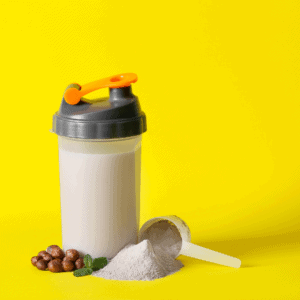
Protein supplements are a popular way to increase protein intake, especially for those who have a hard time meeting their protein needs through food alone. There are many different types of protein supplements available, but some of the most common include whey, casein, pea, and soy protein.
Whey
Whey protein is derived from milk and is one of the most popular and widely used protein supplements. It is a complete protein, meaning it contains all nine essential amino acids that the body needs for muscle growth and repair. Whey protein is quickly absorbed by the body, making it an excellent option for post-workout recovery. It is also relatively low in calories and fat, making it a popular choice for those on a weight loss or low-calorie diet.
Casein
Casein protein is also derived from milk and is another popular protein supplement. It is a slower-digesting protein, which means it can provide a sustained release of amino acids to the muscles over a more extended period. This makes it an excellent option for nighttime use or as a meal replacement.
Pea
Pea protein is a plant-based protein that is derived from yellow peas. It is an excellent option for vegans or those with dairy allergies or intolerances. Pea protein is a complete protein, meaning it contains all nine essential amino acids. It is also relatively low in calories and fat and is an excellent source of iron and other minerals.
Soy
Soy protein is another plant-based protein that is derived from soybeans. It is a complete protein, meaning it contains all nine essential amino acids. Soy protein is also rich in antioxidants and has been shown to have many health benefits, including improving heart health and reducing the risk of certain cancers.
There are many different types of protein supplements available, including whey, casein, pea, and soy protein. Each type of protein has its unique benefits, and choosing the right one for you will depend on your specific goals and dietary needs. However, all protein supplements can be an excellent way to increase protein intake and support muscle growth and repair.
Incorporating Protein into Your Diet

If you’re looking to build muscle, it’s essential to make sure you’re getting enough protein in your diet. There are many strategies for increasing protein intake, such as eating more protein-rich foods or using protein supplements.
Calculating your protein needs is an essential part of building muscle. You can use an online calculator to determine how much protein you need based on your weight, activity level, and goals.
Meal planning is crucial for building muscle, and incorporating high-protein foods into your meals is a great way to ensure you’re getting enough protein. There are many high-protein recipes and snacks available that can help you reach your protein goals.
Timing and Muscle Building
Protein timing is crucial for muscle building. Consuming protein before and after a workout can help support muscle growth and repair. A protein shake or snack within 30 minutes of a workout is an excellent way to ensure your muscles are getting the protein they need.
Combining protein with other nutrients like carbohydrates and fats can also help maximize its effects on muscle building. For example, consuming a protein shake with some fruit or nut butter can provide your body with the energy it needs to support muscle growth.
Role in Muscle Recovery
Protein is essential for muscle recovery and repair. Consuming protein after a workout can help repair muscle tissue and reduce muscle soreness. Protein is also important for preventing muscle loss, especially in older adults.
Using protein to recover from workouts and prevent injury is also important. Consuming protein before and after a workout can help prevent muscle damage and improve recovery time.
For Fat Loss

Protein can also support fat loss by promoting satiety and helping to maintain muscle mass. Studies have shown that consuming a high-protein diet can help people feel fuller for longer and reduce overall calorie intake.
Maintaining muscle mass during weight loss is also critical for preventing a decrease in metabolism. Protein can help prevent muscle loss and ensure that your body continues to burn calories efficiently.
Incorporating protein into a weight-loss diet can be challenging, but there are many strategies for doing so. Increasing protein intake through high-protein foods and protein supplements can help support fat loss.
Protein Conclusion
Protein is an essential nutrient that plays a crucial role in muscle building and overall health and wellness. By understanding the basics of protein and incorporating high-protein foods and supplements into your diet, you can support muscle growth, promote muscle recovery and repair, and even aid in fat loss. Whether you’re a beginner just starting out on your fitness journey or an experienced fitness enthusiast looking to take your workouts to the next level, protein is an essential tool for achieving your goals. So, make sure to prioritize protein in your diet and workout routine, and watch as your muscles grow stronger and your overall health and wellness improve.

